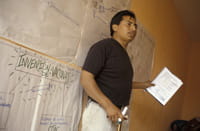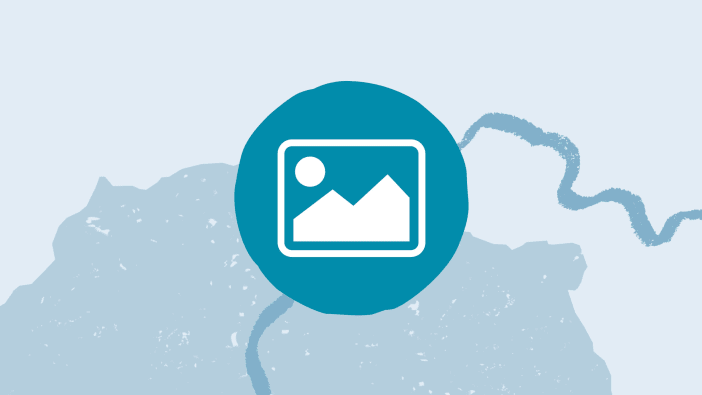by Tim Curtis.

Articles
The value of literacy to the Énxet
Literacy skills allow the small numbers of Énxet speakers to participate more fully and with growing confidence in the decisions that affect their lives and those of their people
2005 Available in English, Georgian, Spanish and Portuguese

Photo: Jim Loring/Tearfund
The Énxet (or Lengua) people of Paraguay are an indigenous hunter-gatherer people numbering about 6,000. Some of them still practise hunter-gathering, despite the loss of most of their lands in the 1930s when the Chaco region was opened up for logging and farming.
Missionaries established a school at Makxawáya over 100 years ago and began work on translating the Bible into the Énxet language. Their first translation of the Gospels and Acts, together with a hymn-book, was published in 1911. Literacy primers for Énxet were developed and a small group became literate. Some of this first group became church leaders and shared the Christian message. Work on translating the Bible still continues. A revised New Testament was produced in 1997 and work on translating the Old Testament into Énxet began in 2003.
During the early part of the 20th century, indigenous people were almost totally marginalised. The encouragement brought by the Christian message and the emergence of a small, but significant, group of literate leaders was very important. The Énxet people felt that they mattered – and the feeling persists.
Today, most literate Énxet are still attached to the church. However, levels of literacy remain low because of the complicated situation regarding languages in the Chaco.
Guaraní is more commonly spoken than Spanish in this part of Paraguay. However, things are changing. Many young people now use Spanish, and this may one day replace Guaraní as the second language of many Énxet speakers. There is a slow improvement in government-run primary schools as a result of major reform in the country’s education system. Where possible, indigenous schoolchildren now learn to read and write in their mother tongue, before making the transition to Spanish.
Other factors have encouraged a growth in literacy. There are many NGOs in the Chaco. These organisations are involved with land rights issues, small-scale agricultural projects and community health programmes. There are also government ministries as well as political organisations, different religious groups, and anthropologists. The presence of all these organisations helps indigenous groups to believe that they really matter as a people. These newcomers provide a strong incentive to learn Spanish, and to become literate in that language. People who are literate can relate more to these different organisations. They are better able to take part in national and international conferences concerning ‘indigenous issues’ and to evaluate the mixed, and often conflicting, motives of these numerous groups.
Literacy skills allow the small numbers of Énxet speakers to participate more fully and with growing confidence in the decisions that affect their lives and those of their people. In doing this, they are beginning to integrate into Paraguayan society – without losing their identity as a people.
Tim Curtis trained in modern languages and linguistics. He has worked in Paraguay with the Iglesia Anglicana Paraguaya for over 20 years, supporting education programmes among the indigenous peoples and leading the Bible translation team. E-mail: [email protected]
Similarly Tagged Content
Share this resource
If you found this resource useful, please share it with others so they can benefit too.

Subscribe to Footsteps magazine
A free digital and print magazine for community development workers. Covering a diverse range of topics, it is published three times a year.
Sign up now - Subscribe to Footsteps magazine




